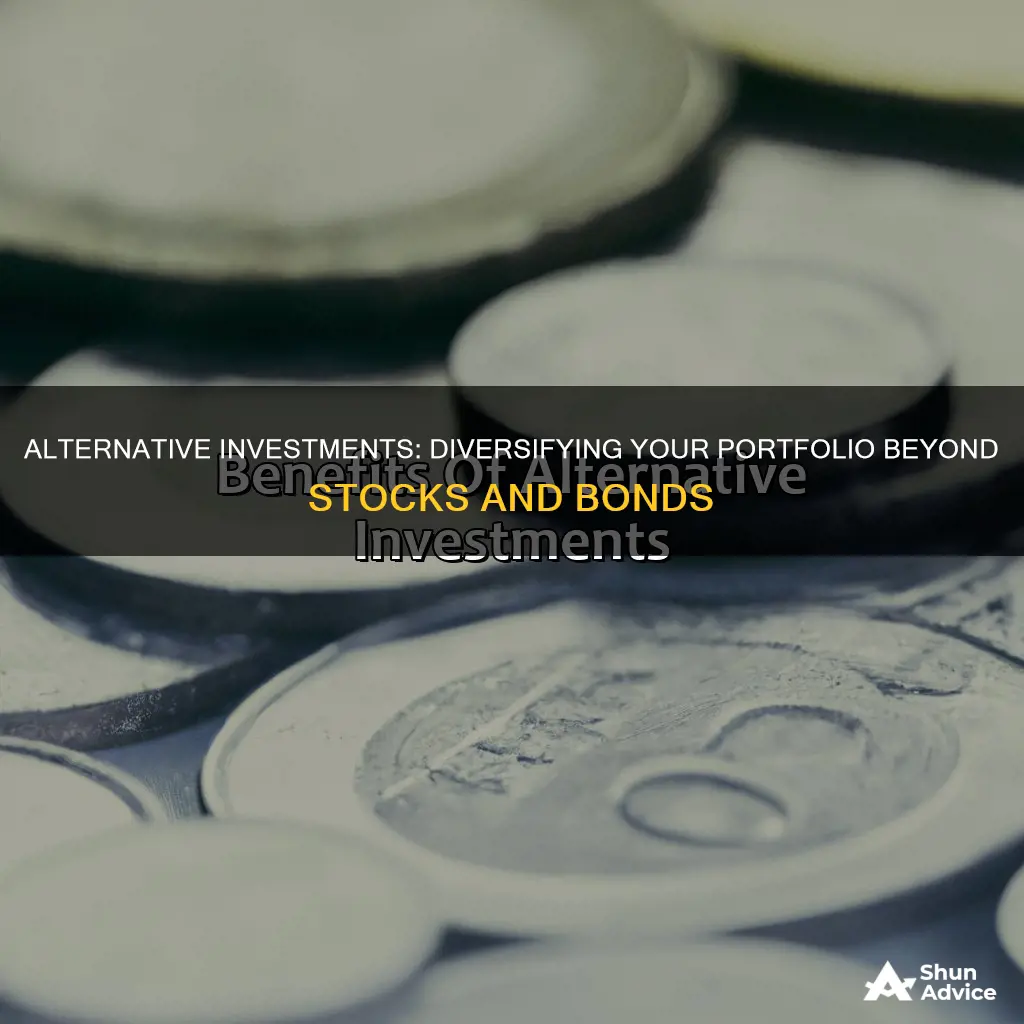
Alternative investments are a way to diversify your portfolio and reduce your exposure to the stock market. They are investments made in asset classes other than stocks, bonds, and cash, such as real estate, commodities, private equity, hedge funds, art, collectibles, and cryptocurrencies.
Alternative investments are not traded on public markets like Dow Jones or NASDAQ, and so there is less transparency around pricing and liquidity. However, this also means that they are usually unaffected by declining traditional market values.
They can be a good way to build wealth and contribute to a cause you care about, but they come with higher risks and require due diligence to find the right opportunities.
| Characteristics | Values |
|---|---|
| Low correlation with traditional financial investments | Stocks and bonds |
| Difficult to determine the current market value of the asset | |
| Relatively illiquid | |
| Costs of purchase and sale may be relatively high | |
| Limited historical risk and return data | |
| A high degree of investment analysis may be required before buying |
What You'll Learn

Alternative investments can be a good way to diversify your portfolio
Alternative investments are typically defined as any investments made in asset classes other than stocks, bonds, and cash. This includes tangible assets like art, antiques, wine, precious metals, and real estate, as well as financial assets like venture capital, hedge funds, private equity, and commodities.
By investing in these alternative assets, you can gain access to markets that are not available through traditional investments. For example, you can invest in private companies, startups, or niche projects like film production or aviation, contributing to a cause you care about while also potentially generating passive income.
Additionally, alternative investments often have a low correlation with the stock and bond markets. This means they can maintain their value in a market downturn and act as a cushion during a stock correction. For instance, gold tends to gain value during economic uncertainty, while equities often lose value.
It's important to note that alternative investments are generally less liquid than traditional investments and may have higher fees and transaction costs. They can also be more complex and riskier, so it's crucial to perform due diligence and consider your comfort zone before investing.
Smart Reasons to Choose CDs Over Investing
You may want to see also

They can help reduce your exposure to the stock market
Alternative investments can help reduce your exposure to the stock market. They are generally considered to be any investments made in asset classes other than stocks, bonds, and cash.
Alternative investments are not traded on public markets like Dow Jones or NASDAQ, and traditionally, they have been invested in through more exclusive channels such as hedge funds, wealth management firms, and accredited investors with high net worth. As a result, there tends to be less transparency around pricing and liquidity. For example, it is easier to sell 5,000 shares of Amazon stock than 5,000 acres of farmland.
However, this lack of transparency and liquidity is not necessarily a bad thing. Alternative investments typically do not fluctuate in tandem with the market and are usually unaffected by declining traditional market values. This means they can be a good way to diversify your portfolio and help reduce your exposure to the stock market.
Alternative investments can also be a way to generate passive income. Low-risk alternative investments such as antiques, wine, and coins are unlikely to make or lose much money.
Additionally, alternative investments can be made using tax-efficient retirement accounts like IRAs. While there are some investments that are off-limits for retirement accounts, the list of alternative investments allowed is still fairly robust.
Furthermore, by allocating money to more niche projects like startups or film, investors can feel good about contributing to a cause they care about.
PAN Card Investment Tracking: A Comprehensive Guide
You may want to see also

They can be a source of passive income
Alternative investments can be a great source of passive income. They can help you generate higher returns and build wealth over time.
One of the key advantages of alternative investments is their ability to provide diversification to your portfolio. By investing in asset classes such as real estate, commodities, private equity, and venture capital, you can reduce your exposure to the stock market and protect yourself from market downturns.
Some alternative investments, like antiques, wine, and coins, are considered low-risk and unlikely to result in significant gains or losses. This stability creates an opportunity for passive income generation. Additionally, alternative investments often have tax benefits, such as the ability to use tax-efficient retirement accounts like IRAs.
It's important to note that alternative investments may require more research and due diligence compared to traditional investments due to their exclusive nature and lack of transparency in pricing. They also tend to have higher fees and expenses.
When considering alternative investments, it's crucial to assess your risk tolerance, liquidity needs, and investment goals. While they offer diversification and higher return potential, they may not be suitable for everyone due to their complexity and higher risk profile.
Investment Strategies: Navigating Change for Success
You may want to see also

They can be invested in using tax-efficient retirement accounts
Alternative investments are any investments made in asset classes other than stocks, bonds, and cash. They can include tangible assets like art, antiques, precious metals, and commodities, as well as financial assets like real estate, private equity, and venture capital.
One of the benefits of alternative investments is that they can be invested in using tax-efficient retirement accounts such as an IRA. While there are some investments that are off-limits for retirement accounts, there is still a fairly robust list of alternative investments that are allowed. This means that investors can build wealth through alternative investments while also enjoying the tax benefits of retirement accounts.
For example, investors can use their retirement accounts to invest in private company equity. This type of alternative investment has the potential for greater returns because investors can get more involved in the business and its people, and can influence decisions. Another option is structured settlements, which are financial agreements settled for plaintiffs in personal injury claims or similar lawsuits. These can provide guaranteed payments backed by court-ordered contracts and highly regulated insurance companies.
Other alternative investments that can be made through retirement accounts include equipment leasing funds, oil and gas producers, artwork and collectibles, timberland, private equity, venture capital, hedge funds, and more.
By using tax-efficient retirement accounts to invest in alternatives, investors can take advantage of the benefits of alternative investments while also enjoying the tax benefits of retirement savings vehicles. This can be a powerful strategy for building wealth over the long term.
Understanding Cash Outflow: Investing Strategies and Money Management
You may want to see also

They can be a way to support niche projects you care about
Alternative investments can be a way to support niche projects that you care about. They can be a good way to diversify your portfolio and reduce your exposure to the stock market.
For example, you can allocate some of your money to more niche projects like startups or film, and feel good about contributing to a cause you care about.
- Real estate
- Private mortgages
- Tax liens
- Private company equity
- Structured settlements
- Farmland
- Equipment leasing funds
- Oil and gas producers
- Artwork and collectibles
- Timberland
- Private equity
- Venture capital
- Hedge funds
- Funds of funds
- Commodities
- Trade finance
- Marine finance
- Litigation funding
- Film
- Aviation
- Franchises
- Distressed debt
- Intellectual property
- Mezzanine debt
- Liquid alternatives
- Structured notes
Fidelity Investment App: A User's Guide to Getting Started
You may want to see also







